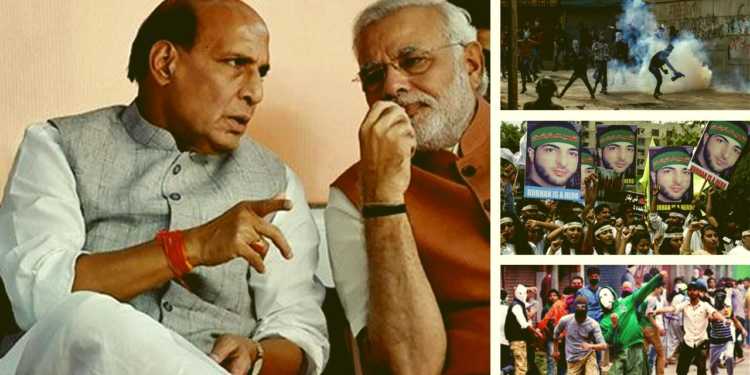On 10 July 2017, the first Monday of the month of Shraavana, the nation woke up to the news of an attack on Amarnath yatra pilgrims. The terrorist attack on a bus carrying the pilgrims killed 8 people and injured 18. There have been terrorist attacks earlier too, but attack on Amarnath Yatra pilgrims was a new low and the people of the country were aghast.
There was no question or doubt about who the terrorists were or where did they come from.
The people of the country wanted the government and Home Minister Rajnath Singh to take some strong action and ensure the safety of the pilgrims. Instead of the strong action against the terrorists, what came from the Home Minister was a tweet about the ‘spirit of Kashmiriyat’ and it being ‘very much alive’.
The people of Kashmir have strongly condemned the terror attack on Amarnath yatris. It shows the spirit of Kashmiriyat is very much alive.
— Rajnath Singh (मोदी का परिवार) (@rajnathsingh) July 11, 2017
Almost 7 months later, a chargesheet filed earlier before the Sessions Court Anantnag and Chief Judicial Magistrate (Anantnag) has established the role of four terrorists of Lashkar e Tayiba who have been killed in separate encounters. The investigations have proved 11 people guilty, of which 4 are under judicial custody. Apart from terrorists from Pakistan, many names that featured in the chargesheet were of Local Kashmiris.
The fact that most of the people behind Amarnath Attacks are Local Kashmiri Muslims brings us back to the Home Minister’s tweet on the spirit of Kashmiriyat. If these people are capable of killing absolutely innocent pilgrims, where is the Kashmiriyat that Rajnath Singh waxed eloquently about, where is the Insaniyat, Jhamooriyat or Kashmiriyat that Atal Bihari Vajpayee so strongly advocated for?
One wonders in utter disbelief if these values ever existed in the first place. It is true that not all Kashmiris are terrorists but the fact that an alarmingly high number of Kashmiris have chosen to be on the path of extremism and violence, deftly supported by terrorists from the other side of the border. Yes, we cannot go around arresting and punishing innocent Kashmiris, but we also cannot let terrorists, many of whom are Kashmiris, to kill innocent people.
Tackling terrorism is not an overnight policy intervention but it needs to be started somewhere. The first step has to be separation of fact from fiction; the fact is that many terrorists are Kashmiris and fiction is that Kashmiriyat is a value that embraces the whole valley. If Kashmiriyat was a value that embraced the whole of Kashmiri valley, terrorism would have been tackled by moral lectures and love and reasoning but such things exist only in movies and literatures soaked in the idea of pointless romanticism.
Secondly, the people in power need to take stringent actions which at times may include some collateral damage. But this is important so that we do not continue counting the number of innocent people who get killed because the state has been inept in calling a spade, a spade. Flowery terms like Insaniyat, Jhamooriyat and Kashmiriyat sound nice and soothing in Chinar adorned mesmerizing landscapes, not in a valley haunted by bloodshed and cries of the innocents amidst the cacophony of bombs and bullets.
Thirdly, stringent action should be complemented by major legislative changes. Any strong step against terrorism can only be a short-term solution unless substantiated by major legislation changes- whether it is Article 370 or Article 35a, it is about time that legislative changes are made.
Talking soft about Kashmir has been the policy of almost all governments at the Centre. But if this continues even with the current government, then thousands more will be killed and their families will suffer and the hope that peace will be restored in the valley will be lost. If the government continues the façade of Kashmiriyat, it will let down every single soldier who died in Kashmir.

























